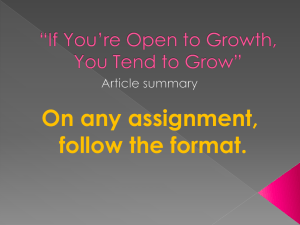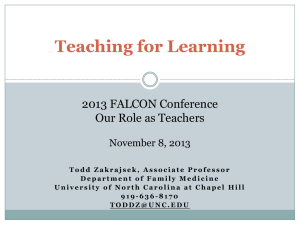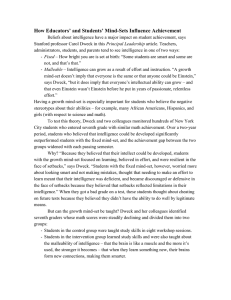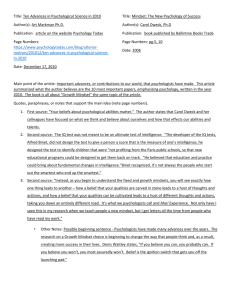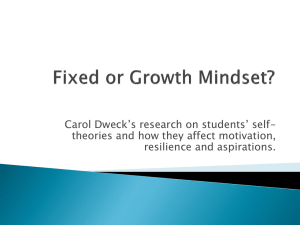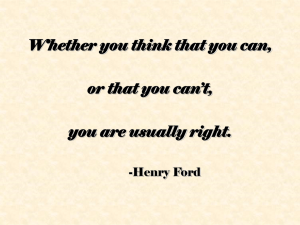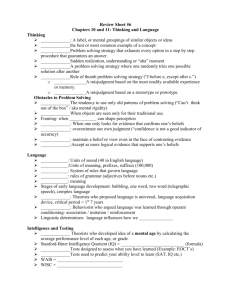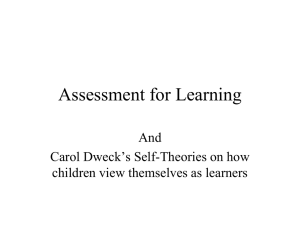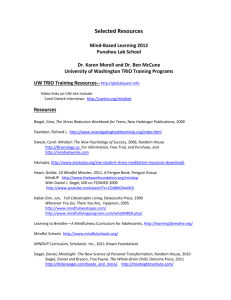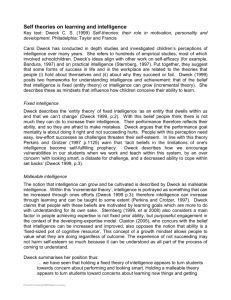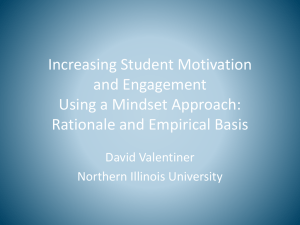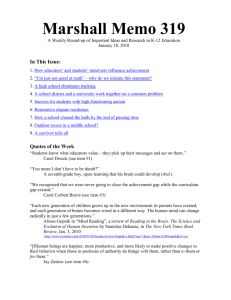Dweck's Motivation Theory: Fixed vs. Growth Mindset
advertisement
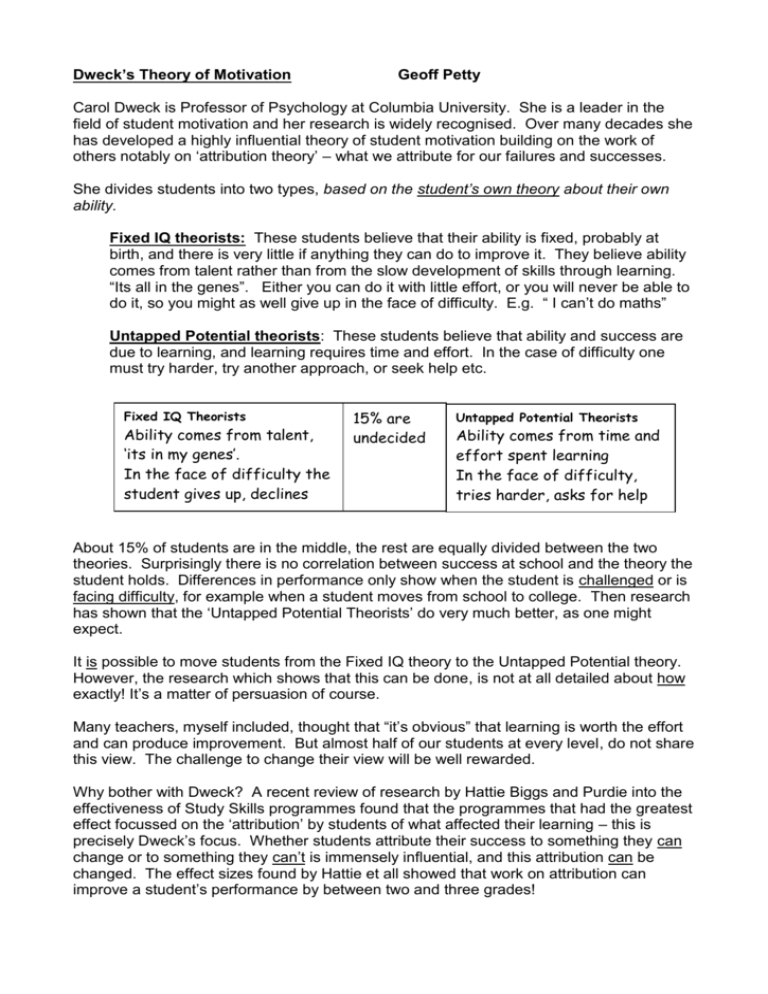
Dweck’s Theory of Motivation Geoff Petty Carol Dweck is Professor of Psychology at Columbia University. She is a leader in the field of student motivation and her research is widely recognised. Over many decades she has developed a highly influential theory of student motivation building on the work of others notably on ‘attribution theory’ – what we attribute for our failures and successes. She divides students into two types, based on the student’s own theory about their own ability. Fixed IQ theorists: These students believe that their ability is fixed, probably at birth, and there is very little if anything they can do to improve it. They believe ability comes from talent rather than from the slow development of skills through learning. “Its all in the genes”. Either you can do it with little effort, or you will never be able to do it, so you might as well give up in the face of difficulty. E.g. “ I can’t do maths” Untapped Potential theorists: These students believe that ability and success are due to learning, and learning requires time and effort. In the case of difficulty one must try harder, try another approach, or seek help etc. Fixed IQ Theorists Ability comes from talent, ‘its in my genes’. In the face of difficulty the student gives up, declines learning support, guesses etc 15% are undecided Untapped Potential Theorists Ability comes from time and effort spent learning In the face of difficulty, tries harder, asks for help etc About 15% of students are in the middle, the rest are equally divided between the two theories. Surprisingly there is no correlation between success at school and the theory the student holds. Differences in performance only show when the student is challenged or is facing difficulty, for example when a student moves from school to college. Then research has shown that the ‘Untapped Potential Theorists’ do very much better, as one might expect. It is possible to move students from the Fixed IQ theory to the Untapped Potential theory. However, the research which shows that this can be done, is not at all detailed about how exactly! It’s a matter of persuasion of course. Many teachers, myself included, thought that “it’s obvious” that learning is worth the effort and can produce improvement. But almost half of our students at every level, do not share this view. The challenge to change their view will be well rewarded. Why bother with Dweck? A recent review of research by Hattie Biggs and Purdie into the effectiveness of Study Skills programmes found that the programmes that had the greatest effect focussed on the ‘attribution’ by students of what affected their learning – this is precisely Dweck’s focus. Whether students attribute their success to something they can change or to something they can’t is immensely influential, and this attribution can be changed. The effect sizes found by Hattie et all showed that work on attribution can improve a student’s performance by between two and three grades! Dweck’s Questionnaire The following questionnaire can be used to find out whether students as ‘fixed IQ theorists’ or ‘Untapped Potential theorists’. Professor Carol Dweck Columbia US devised it and its been fully validated etc. However, you could devise your own, though it might not work so well. Read each sentence below and then circle the one number that shows how much you agree with it. There are no right or wrong answers. 1 Strongly agree 1. You have a certain amount of intelligence, and you really can’t do much to change it 2. Your intelligence is something about you that you can’t change very much 3. You can learn new things, but you can’t really change your basic intelligence 2 Agree 3 Mostly Agree 4 Mostly disagree 5 Disagree 6 Strongly Disagree Consequences of Dweck’s Theory of Motivation for teachers Avoid giving ‘person orientated praise’: e.g. ‘I’m proud of you’; ‘you’re good at this’. Because it: assumes that success is due to personal attributes teaches students to interpret difficulties in terms of their personal weaknesses. Instead, give ‘process orientated praise’, This is focussed on the process required for success. For example, praise the student’s effort, and strategy. E.g: ‘You really tried hard’; ‘That was a good way to do it’; Because it: sells the idea that esteem comes from striving and from the use of effective strategies, teaches students to interpret setbacks in terms of lack of effort, or inappropriate strategies allows every student to earn praise Use also ‘task orientated’ praise. For Example: ‘All the labels are correct’ ‘There are hardly any spelling mistakes this time.’ Establishing a Growth Ethos Stress that: Intelligence and ability can be cultivated Effort is required for learning Effort grows connections in your brain which make you smarter The brain is like a muscle which strengthens with exercise and you need to ‘work out’ to get bright. (teachers have added more than 30 points to IQ scores) Don’t attribute difficulty to fixed intelligence Avoid defensive withdrawal of effort How? Teach the idea, and refer to it at appropriate times etc. Induction activities Use the Dweck questionnaire and consider ‘Fixed IQ Theorists’ as ‘at risk’. Course mottos, logos, posters etc Analogies for learning o Gym workout (‘the brain is a muscle’) o Learning a musical instrument o Rock rolling o Learning a computer game, getting stuck at a level, and then finding the way up a level by persistent trial and error. Whole class tutorials sessions o Peer tutoring: get second year students to teach the growth ethos to first year students. One to ones Pairing up ‘growth’ and ‘fixed’ students? Role Models and Evidence Past students who have succeeded could visit or be used as inspiring models. Also: Research shows that some of the most creative people have average IQs Some of the highest attainers have average IQs Einstein did badly at school and at college. His teacher said in a report “You will never amount to very much”. 30 points have been added to IQ scores the brain grows! Thomas Eddison was thrown out of school for being ‘educationally subnormal’. Use self-assessment, peer assessment and spoof assessment These methods have been found to make huge differences to students ‘attributions’s, and have doubled attainment in mathematics and related subjects. Students can self assess against criteria, or against model answers with a mark scheme. Spoof assessment is where the teacher gives students a copy of a spoof piece of work, or an anonymous piece of work done by a student in a previous year. Students are asked to mark this, perhaps using assessment criteria, or a model answer with a mark scheme. The the teacher discusses the allocation of marks. These methods all show the learner that success depends on what they do, not on their innate ability or I.Q. etc. Students realise how they lost marks and how to ensure they do better next time. These are very underused strategies and make excellent homeworks. See ‘formative teaching’ on the active learning page of www.geoffpettycom for more detail. E-mail geoff@geoffpetty.com for a more detailed handout on Dweck, or better still read: Dweck, C. S. (1999) Self Theories: Their Role in Motivation, Personality, and Development. Hove: Psychology Press, Taylor and Francis Group.
